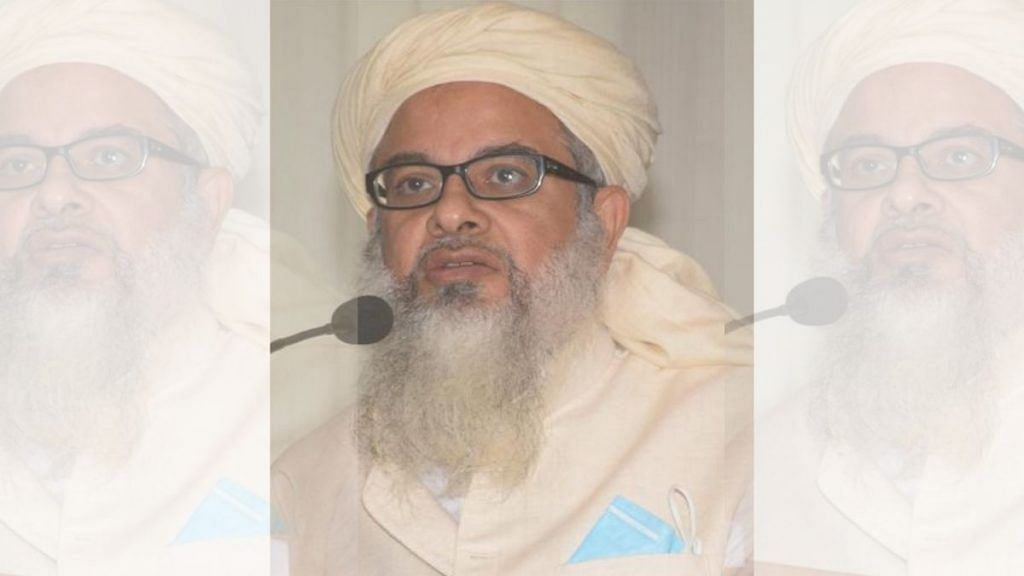Lucknow: “We will bear the cruelties, we will bear the sorrows but not let our country be harmed,” Jamiat Ulema-E-Hind (JUH) president Maulana Mahmood Asad Madani said Saturday, while addressing the two-day national governing body meeting of the JUH. The JUH is an organisation of Muslim scholars, which split into two groups in March 2008 — the Arshad (Madani) group, symbolised by the alphabet ‘A’ and Mahmood’s group, represented by ‘M’.
The meeting which comes in the backdrop of recent controversies over the ‘places of worship act’ and the litigations involving Varanasi’s Gyanvapi mosque and Mathura’s Shahi Idgah, is being attended by about 5,000 Muslim scholars from across the country.
“We need courage and strength and we are weak people. Weakness doesn’t mean that someone resorts to sycophancy. If Jamiat Ulema decides that we are messengers of peace, if it decides that we can bear the cruelties, if it decides that we will bear the sorrows but not let our country be harmed, then this is not because of any weakness, but because of the strength of the Jamiat. And this strength has been given to us by the Quran and Allah..,” said Madani.
The JUH also passed a resolution Saturday to take measures to tame “the growing tide of hatred and animosity against Muslims in the country”.
These measures include the call for a separate law to specifically punish instigators of violence, as mentioned in Report 267 of the Law Commission (on Hate Speech), published in 2017, and efforts to ban any activity aimed at social and economic isolation of all minorities, especially the Muslim minority. The resolution also called for the observance of the UN-designated International Day to Combat Islamophobia’ on 15 March every year.
On that day “a message of human dignity shall be disseminated across the world and display (of) our common commitment for the eradication of all forms of racism and religious discrimination” the JUH resolution said.
The JUH further said that to address the situation (‘Islamophobia and anti-Muslim sentiments’), it has set up a permanent department called the “Justice and Empowerment Initiative for Indian Muslims”, with the prime objective to develop a strategy for the establishment of peace and justice in the country.
In its resolution, the JUH noted that there was a need to draw the attention of the Indian government to the requirement to tame the growing tide of hatred and animosity in the country, which is against the basic principles of democracy, equality and justice and call upon all the peace loving and patriotic forces to unite together to fight the extremist and fascist forces at the political and social level, instead of getting reactionary and sentimental.
Propaganda against Muslims, Islamic culture on zenith
“Nowadays hatred and religious bigotry has cast a shadow on our country. In the name of clothing, food, faith, festival or language and economy etc, Indians are pitted against their own countrymen. Instead of engaging youths in constructive works, they are being used as a tool to wreak havoc in the country,” said the JUH resolution.
The most “unfortunate part of this sad saga”, it claimed, “is that the government of the day is patronising these destructive activities. It has left no stone unturned in poisoning the minds and hearts of the members of the majority community. Besides that, the national media has become an effective tool to spread sensation and provocation. Baseless propaganda against Muslims, Muslim rulers and Islamic culture etc. has reached its zenith. The government of the day instead of taking legal action against hate mongers has been patronising them”.
Referring to alleged hate speeches made at a few dharm sansads, Niaz Ahmed Farooqui, general secretary, JUH, told the gathered media that“The biggest issue has become that of the religious places. Although this is not the biggest issue, it is being created (as such”.
Answering a question on the Gyanvapi mosque controversy, Farooqui said that the matter was subjudice and should not be brought to the roads (outside court).
The JUH has also announced that it will organise more than a thousand sadbhavna sansad (goodwill meetings) across the country, to curb the growing tide of hatred allegedly being spread by dharma sansads and and some organisations and people.
(Edited by Poulomi Banerjee)
Also read: Mandir or Masjid? New surveys not needed, just acceptance of truth & move towards reconciliation
